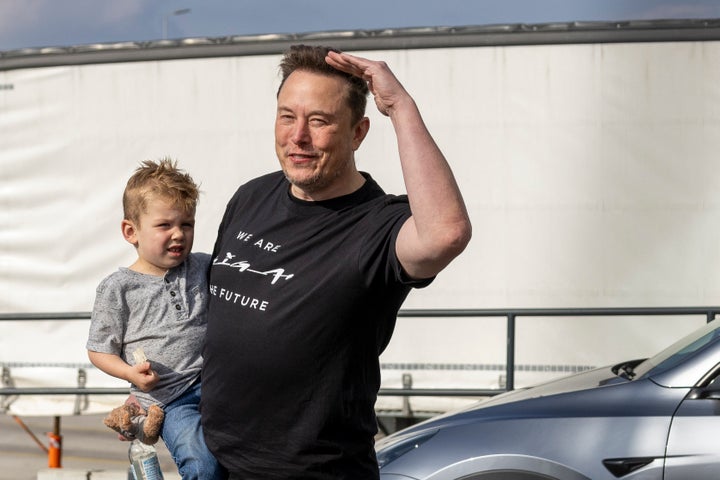It might be news to Elon Musk, but he and Nick Cannon are locked in a friendly (albeit very weird) competition.
Last month on X (formerly known as Twitter), Cannon, the host of “The Masked Singer,” threatened that if his meme coin did well, he’d sire a few more children to beat the tech billionaire’s tally. (Cannon has 12 children with six women, including two kids with Mariah Carey. Musk has 14 known children with four women.)
“If the Wild’N Out Token gets to 100 million market cap I’m having 3 more kids to beat @elonmusk,” the comedian posted on X, seemingly as a joke.
It’s not the first time Cannon has attempted to engage with Musk over their favorite subject ― procreation with as many women as possible, sometimes with women being pregnant at the same time.
In 2022, not long after it was revealed that Musk’s then-girlfriend Grimes had given birth to her second child with him, the Tesla CEO tweeted, “Doing my best to help the underpopulation crisis. A collapsing birth rate is the biggest danger civilization faces by far.”
Cannon jumped right in, replying “Right there with you my Brother!” alongside a fist bump emoji.
While they’re part of a small club ― famous super-procreators who have volunteered to father Taylor Swift’s child (gross) ― they have different reasons for their amped-up virility.
In his own words, Cannon is taking a “be fruitful and multiply” approach to fatherhood; in March, when asked if he’d have another child, he said that he’s “leaving it to the Lord”― though a week later, he said he’s “pressing hold” on his plans for now because having another little Cannon would do a number on his finances. (Understandably. The average cost to raise just one child born in 2015 through age 17 is now roughly $310,605.)
Money, of course, is no object for Musk, the richest person in the world. His reasoning for having so many children isn’t religious, though he speaks about the need to reproduce with a kind of religious fervor.
Musk, an adviser to President Donald Trump, is on a personal mission to counter declining global fertility. He reportedly talks privately about wanting to sire “legion-level” numbers of children “before the apocalypse” ― he’s even said to have solicited women to have his babies on X, according to a report from The Wall Street Journal earlier in April. Publicly, Musk isn’t as loose-lipped about his family-planning goals as Cannon; he’s reportedly shelled out millions of dollars to keep some of the mothers of his kids quiet.
Britta Pedersen-Pool/Getty Image; Prince Williams/Getty Images
How much time Cannon and Musk spend with their kids is unclear. Musk does spend a lot of time with the 4-year-old son he shares with Grimes; the little boy is often seen at the White House with his dad and the president. And Cannon attempts to spread himself out evenly; on Father’s Day, for instance, he said he tries to give all 12 of his kids the “opportunity to connect” with him. (As someone joked on Reddit, “Man’s talking about his own kids like he’s a middle manager doing quarterly reviews.”) But the question remains, even if you can afford that many kids, can you afford to give them each enough of your time?
That’s pretty much all either man has said publicly about the subject, but you have to wonder: What is it that drives a human to have dozens of kids ― possibly even more than that, in Musk’s case? We come bearing answers, or at least some possible scenarios.
Some pronatalists look at having tons of kids as a civilization-saving project.
The U.S. has seen its birth rate steadily decline over the past 15 years. Musk has made no secret that he’s concerned declining global fertility rates “will lead to mass extinction of entire nations.”
The belief that couples need to procreate in a tizzy to tackle population decline is shared by quite a few people these days: religious conservatives like Vice President JD Vance, strongmen authoritarian leaders like Vladimir Putin, that weird bespectacled hipster couple that keeps making the news for their pro-birther beliefs.
As those varied names suggest, there’s actually multiple strains of pronatalism, said Karen Benjamin Guzzo, a sociology professor and the director of the Carolina Population Center at the University of North Carolina at Chapel Hill.
One is the type that Musk and other Silicon Valley elites promote, where IVF tends to be used to select (or create) what they see as genetically superior children. Musk seems to be particularly concerned with his kids’ genetics. The tech CEO reportedly asked MAGA influencer Ashley St. Clair to have their baby delivered via caesarean section, having previously claimed on X that C-sections allow for “a larger brain.”
Guzzo said some tech pronatalists believe people who have babies “the old-fashioned way” will eventually produce a system where their children are inferior ― “not as tall or prone to depression or less intelligent” ― at least compared to those who can afford to have genetically modified babies.
“In some ways, though, they don’t mind the other group existing: Those are future workers and consumers,” she said. (If this all sounds vaguely eugenicist to you, you’re on the right track; historically ― and currently ― U.S. pronatalism has been tied to an interest in eugenics.)
A second type of pronatalists are religious groups that do not approve of IVF and believe we need to be promoting early marriage and early childbearing while outlawing abortion and contraception.
“They blame low birth rates on feminism, driven by women’s increased levels of education and employment,” Guzzo said.
The final group of pronatalists are those who are specifically worried about higher rates of fertility among “undesirables,” primarily defined by race, ethnicity and immigration status, Guzzo said.
“They want more births among native-born white Christians and less among other groups,” she said.
One problem with pronatalists is that they seem unwilling to concede that it’s not some anti-child ideology that’s driving most millennials and younger people to hold off on having kids; it’s the cost of raising those kids. (Recently, President Donald Trump has expressed some interest in the idea of giving new parents a $5,000 “baby bonus,” though if you’re uninsured, that won’t even cover the hospital stay.)

Maja Hitij via Getty Images
Many scientists and academics consider Musk’s declaration of “mass extinction numbers” an exaggeration. What’s more, not all experts look at lower fertility rates as negative.
“In many ways, tumbling fertility rates are a success story, reflecting not only better, easily available contraception, but also many women choosing to delay or have fewer children, as well as more opportunities for education and employment,” as professor Stein Emil Vollset from the Institute for Health Metrics and Evaluation said to Newsweek last year.
Some have argued that focusing on raising birthrates diverts attention from more pressing global issues like climate change, food scarcity and numerous refugee crises.
A lot of super procreators are ego-driven, believing the world needs more of them.
The all-consuming need to breed could also be an ego trip thing. The desire to procreate ― to even hyper procreate ― isn’t exclusive to celebrities. But when power, wealth and influence are involved, the line between fantasy and reality can easily become blurred.
Musk reportedly seems open to paying ancillary women to have his kids. “To reach legion-level before the apocalypse, we will need to use surrogates,” the tech CEO reportedly texted St. Clair while she was pregnant with his child, according to The Wall Street Journal.
“With more power comes the desire and ego-driven states to be in control, admired by others and never forgotten,” said Shannon Chavez, a psychologist and sex therapist in Beverly Hills, California.
“The idea of reproduction becomes symbolic,” she explained. “It also challenges the social norms many of these men grew up with or saw their parents adhere to.”

Bauer-Griffin via Getty Images
And some people just have a breeding kink.
Far from niche, breeding kinks are more mainstream than ever. Videos about breeding kinks have millions of views on TikTok, and on PornHub, breeder porn is increasingly popular.
While sexual kinks are highly personal ― your foot fetish may be drastically different than some other guys perusing wikiFeet ― a breeding kink simply means that the thought of getting pregnant or impregnating someone turns you on, said Samantha Manewitz, an AASECT-certified sex therapist and Ph.D. candidate at the University of Toronto.
“It can be a fun fantasy that stays in the realm of imagination, part of a kinky role play, an exploration of taboo,” she told HuffPost. “The idea of something being ‘naughty’ or provocative can be part of healthy sexual desires.”
You don’t have to even want kids to have a breeding fetish, either ― being fervently anti-having-kids might actually make it extra kinky for some people. It’s not just men who have breeding fantasies, either. There are cis women and trans folks who have breeding fetishes, Manewitz said.
As with many kinks, there is an eroticizing of power with a breeding kink, Chavez said.
“Some may be drawn to this kink as a deep desire to feel needed, irreplaceable or dominating over someone to feel important and in control,” she said.
As that statement suggests, a breeding kink is sometimes part of BDSM play for people — the idea being that the Dom would “inseminate” the sub. But it’s plenty mainstream, too.
The other reason it’s hot for some? Men are told in religious texts and bawdy teen movies that they have a primal urge to “spread their seed” hardwired into them ― but it’s an urge that’s complicated by the very real fear of impregnating someone and being careful not to ejaculate inside of a woman to prevent the consequences.
As soon as they’re of reproductive age, people who can get pregnant are careful, too ― arguably more so now, with the rollback of Roe v. Wade and efforts to restrict abortion access.
“The breeding fantasy allows women to explore their relationship with sexual health and reproduction through domination and submission and power dynamics,” Chavez said.

Hector Roqueta Rivero via Getty Images
Basically, a breeding kink ― or coming precariously close to unprotected sex ― provides a heady release for the kink-haver. Exploring the kink with a willing partner is a chance to play with the power of those consequences, without shame, fear or feeling trapped.
Still, Manewitz said it’s worth noting here that there are forms of breeding kinks that are legitimately problematic or coercive.The language and conventions of kink and BDSM can be easy to weaponize, especially when they’re divorced from the BDSM community’s norms around informed and affirmative consent, she explained.
Buying someone’s silence ― as Musk has reportedly tried to do with a number of the women he’s had children with ― is “a textbook example of coercive control,” Manewitz said.
And while not exclusive to breeding kinks, one of oldest forms of coercive control over anyone with a uterus is getting them pregnant, the sex therapist said. That’s because when you have a lot of kids, it’s extremely difficult to financially support them solo if you manage to get out of a controlling relationship.
All this said, with consent and understanding, a breeding kink can absolutely be a fun, baggage-free part of a healthy sex life. You can have a breeding kink and not be weird about it ― or act like you’re saving mankind all through your super sperm.
Read the full article here








